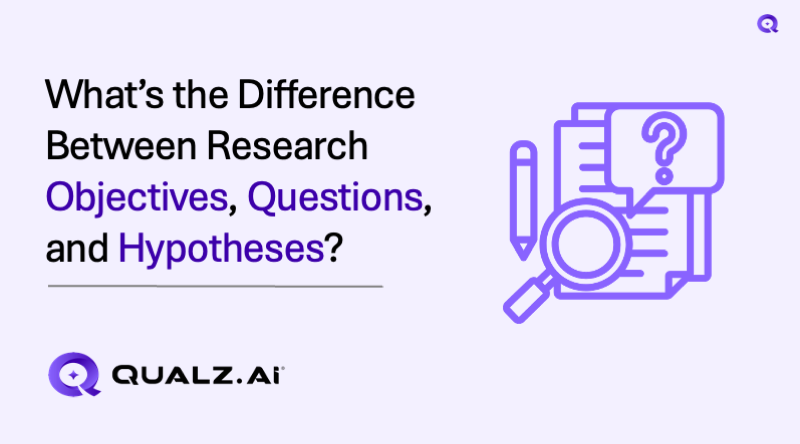In academic research, precision in language leads to precision in thinking. Yet many students and early-career scholars find themselves entangled in overlapping definitions of objectives, research questions, and hypotheses. These elements are distinct but deeply interconnected, and understanding how they function individually and collectively is key to designing a methodologically sound study.
Why Distinguishing These Elements Matters
Clarity in your research framework is not only critical for meeting academic expectations but also for producing work that is rigorous, replicable, and impactful. Whether you’re preparing a thesis proposal, applying for funding, or writing a journal article, your ability to differentiate and articulate each of these components affects every aspect of your study, from design to analysis.
Topics Covered
ToggleWhat Are Research Objectives?
Research objectives define what you intend to accomplish. They emerge from your problem statement and articulate the broader purpose of your investigation. Objectives are directional—they provide a roadmap for your study.
For example, a researcher exploring collaborative learning might set an objective such as:
To investigate how peer-led group discussions influence academic confidence among first-year university students.
Objectives like this align closely with what the researcher ultimately wants to uncover. For a deeper understanding of how these statements are structured and used, review this explanation of what constitutes strong research objectives.
What Are Research Questions?
Research questions operationalize your objectives. They specify exactly what the study will explore and guide your choice of data collection methods. Unlike broad objectives, research questions are targeted and focused.
Building on the previous example, a relevant research question could be:
How do students describe the impact of peer-led discussions on their academic confidence in their first year of university?
This question invites open-ended responses, particularly valuable in qualitative studies. Academic researchers can benefit from understanding how well-structured research questions set the foundation for credible qualitative inquiry.
What Is a Hypothesis?
A hypothesis is a predictive statement that proposes a possible relationship between variables. While commonly associated with quantitative research, hypotheses can also guide qualitative studies by offering testable assumptions that shape thematic analysis or comparative coding.
In the case of the same study, a researcher might hypothesize:
Students who participate in weekly peer-led groups will demonstrate higher academic confidence than those who do not.
When researchers transition from qualitative findings to pattern testing or thematic validation, understanding when and how to quantify qualitative data becomes essential.
How Objectives, Questions, and Hypotheses Work Together
These components function in tandem to construct a coherent research design:
- The objective outlines the aim.
- The question narrows the scope.
- The hypothesis predicts the outcome.
Once data is collected, processes like code categorization allow researchers to organize findings in a way that directly ties back to the original objective and questions. This structured flow not only ensures consistency but also enhances analytical depth.
Why This Distinction Is Crucial in Academic Research
Clearly defined objectives, questions, and hypotheses are cornerstones of academic rigor. They help avoid common pitfalls such as ambiguous focus, methodological drift, or misalignment between research aims and data analysis. Moreover, they strengthen the credibility of your findings in peer-reviewed settings.
Researchers who clearly articulate these components also have a strategic advantage when conducting thematic analysis. Structured thematic exploration, as outlined in this overview of modern approaches to thematic analysis, often hinges on the clarity of the initial research framework.
Real-World Academic Examples
Example 1: Education Research
- Objective: To explore the effects of digital tools on engagement in hybrid classrooms.
- Research Question: How do students perceive the use of interactive apps in hybrid learning environments?
- Hypothesis: Students using interactive apps will report higher levels of engagement than those in non-tech-enhanced settings.
Example 2: Social Psychology
- Objective: To examine how online anonymity influences discourse quality in academic forums.
- Research Question: What impact does user anonymity have on the tone and depth of peer responses in university discussion boards?
- Hypothesis: Anonymous users will express more critical viewpoints than users with identifiable profiles.
- In both examples, hypotheses may be evaluated through methods that involve open coding and detailed categorization. Tools such as a structured codebook and effective data visualization can help translate raw narratives into interpretable insights.
Conclusion
Research objectives, questions, and hypotheses are not interchangeable; they are sequential steps in a logically structured inquiry. Mastering these distinctions empowers you to craft research that is not only methodologically solid but also communicative, purposeful, and aligned with scholarly expectations.
This clarity also enhances your ability to connect theory with analysis and ensures that every component of your research, down to the coding and visual presentation, is rooted in purpose.
For academics seeking to deepen their understanding of qualitative research design, exploring these related concepts will reinforce their foundation and strengthen the impact of your work.
